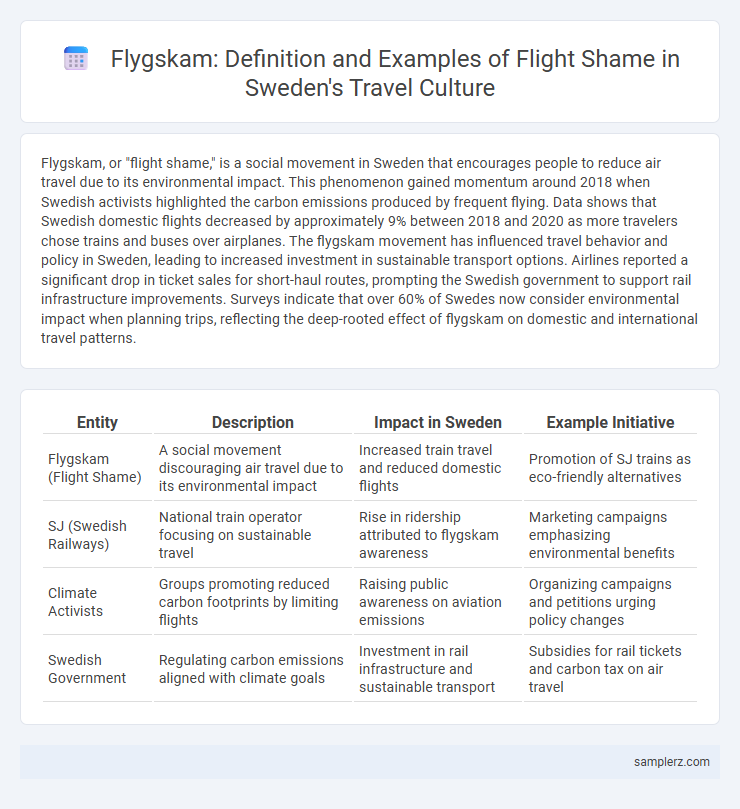Flygskam, or "flight shame," is a social movement in Sweden that encourages people to reduce air travel due to its environmental impact. This phenomenon gained momentum around 2018 when Swedish activists highlighted the carbon emissions produced by frequent flying. Data shows that Swedish domestic flights decreased by approximately 9% between 2018 and 2020 as more travelers chose trains and buses over airplanes. The flygskam movement has influenced travel behavior and policy in Sweden, leading to increased investment in sustainable transport options. Airlines reported a significant drop in ticket sales for short-haul routes, prompting the Swedish government to support rail infrastructure improvements. Surveys indicate that over 60% of Swedes now consider environmental impact when planning trips, reflecting the deep-rooted effect of flygskam on domestic and international travel patterns.
Table of Comparison
| Entity | Description | Impact in Sweden | Example Initiative |
|---|---|---|---|
| Flygskam (Flight Shame) | A social movement discouraging air travel due to its environmental impact | Increased train travel and reduced domestic flights | Promotion of SJ trains as eco-friendly alternatives |
| SJ (Swedish Railways) | National train operator focusing on sustainable travel | Rise in ridership attributed to flygskam awareness | Marketing campaigns emphasizing environmental benefits |
| Climate Activists | Groups promoting reduced carbon footprints by limiting flights | Raising public awareness on aviation emissions | Organizing campaigns and petitions urging policy changes |
| Swedish Government | Regulating carbon emissions aligned with climate goals | Investment in rail infrastructure and sustainable transport | Subsidies for rail tickets and carbon tax on air travel |
Understanding Flygskam: The Rise of Flight Shame in Sweden
Flygskam, or flight shame, has gained significant traction in Sweden as an environmental movement discouraging air travel due to its high carbon emissions. Key Swedish organizations like Flygfritt have promoted train travel and sustainable alternatives to reduce the aviation industry's environmental impact. Public awareness campaigns and government initiatives have further amplified flygskam, influencing many Swedes to reconsider their travel choices in favor of eco-friendly options.
Greta Thunberg: Catalyst for the Flygskam Movement
Greta Thunberg, the Swedish climate activist, emerged as a pivotal catalyst for the flygskam movement, encouraging a shift away from air travel due to its carbon emissions. Her public advocacy and refusal to fly, choosing instead sustainable modes of transportation, sparked nationwide and international awareness around the environmental impact of aviation. This movement led to increased support for alternative travel options in Sweden, such as trains and buses, promoting lower carbon footprints among travelers.
Decline in Domestic Flights: Swedish Air Travel Statistics
Sweden has experienced a notable decline in domestic flights as a result of the flygskam (flight shame) movement, with data from the Swedish Transport Agency showing a 10% reduction in domestic air travel between 2018 and 2023. Sustainable alternatives, including train travel, have gained prominence, supported by improved rail infrastructure and government incentives. The shift reflects broader environmental awareness and is reshaping Sweden's transportation patterns toward lower carbon emissions.
The Growth of Tågskryt: Train Pride as an Alternative
Tagskryt, or Train Pride, has surged in Sweden as a sustainable alternative to air travel, reflecting the country's increasing environmental awareness and desire to reduce carbon emissions. High-speed trains like SJ's X2000 and regional services provide efficient, low-carbon options connecting major cities such as Stockholm, Gothenburg, and Malmo. This growing movement not only challenges flygskam (flight shame) but also promotes rail travel as a symbol of eco-conscious lifestyle and national pride.
Personal Stories: Swedes Who Gave Up Flying
Several Swedes have embraced flygskam by sharing personal stories of giving up flying to reduce their carbon footprint. One notable example is activist and author Johan, who switched to train travel for both work and vacations, highlighting improved environmental benefits and personal well-being. Stories like these inspire a growing movement in Sweden, where individuals prioritize sustainable travel options over air travel to combat climate change.
Swedish Companies Embracing Flygskam Policies
Several Swedish companies, including IKEA and H&M, actively embrace flygskam policies by reducing business flights and promoting sustainable travel alternatives like trains and digital meetings. SJ, the Swedish national railway company, highlights increased passenger numbers as consumers and corporations shift preference from air travel to rail options. These initiatives align with Sweden's national goal to achieve net-zero carbon emissions by 2045, demonstrating corporate commitment to environmental responsibility.
Public Campaigns and Social Media Impact in Sweden
Public campaigns in Sweden addressing flygskam have effectively raised awareness about the environmental impact of air travel, promoting alternatives such as trains and buses. Social media platforms amplify these messages by encouraging users to share eco-friendly travel choices, creating a collective movement that influences public behavior. Data from Swedish environmental agencies show a measurable decrease in domestic flight bookings correlating with campaign visibility and social media engagement.
Government Initiatives to Curb Air Travel Emissions
Sweden's government launched initiatives targeting flygskam, or "flight shame," to reduce air travel emissions by promoting sustainable alternatives like high-speed rail and incentivizing electric vehicle use. Policies include increased taxes on domestic flights and subsidies for green transportation infrastructure to shift public behavior towards eco-friendly travel. These measures contribute significantly to Sweden's commitment to achieving net-zero emissions by 2045 under its climate action framework.
Sustainable Tourism Trends Among Swedish Travelers
Swedish travelers increasingly embrace sustainable tourism trends, driven by the flygskam movement, which discourages air travel due to its environmental impact. Many opt for train journeys and local destinations to reduce carbon emissions, reflecting a broader shift towards eco-friendly travel choices. This trend fuels growth in Sweden's green tourism sector, highlighting a commitment to environmental responsibility.
The Future of Travel in Sweden: Toward Carbon-Neutral Journeys
Sweden's flygskam movement significantly reduces domestic air travel, encouraging sustainable alternatives such as high-speed rail and electric buses. Investments in carbon-neutral technologies and infrastructure aim to make Sweden a leader in eco-friendly travel by 2045. Future travel initiatives prioritize minimizing CO2 emissions, aligning with Sweden's goal of net-zero greenhouse gases.

example of flygskam in Sweden Infographic
 samplerz.com
samplerz.com